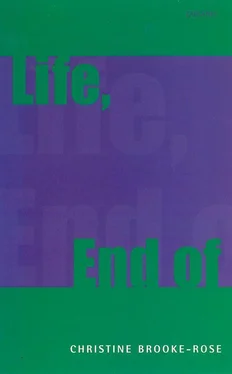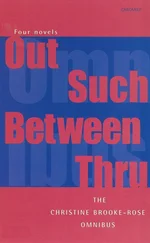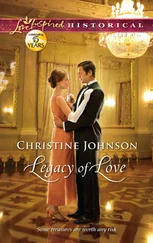Christine Brooke-Rose - Life, End of
Здесь есть возможность читать онлайн «Christine Brooke-Rose - Life, End of» весь текст электронной книги совершенно бесплатно (целиком полную версию без сокращений). В некоторых случаях можно слушать аудио, скачать через торрент в формате fb2 и присутствует краткое содержание. Год выпуска: 2012, ISBN: 2012, Издательство: Carcanet Press Ltd., Жанр: Современная проза, на английском языке. Описание произведения, (предисловие) а так же отзывы посетителей доступны на портале библиотеки ЛибКат.
- Название:Life, End of
- Автор:
- Издательство:Carcanet Press Ltd.
- Жанр:
- Год:2012
- ISBN:9781847775726
- Рейтинг книги:5 / 5. Голосов: 1
-
Избранное:Добавить в избранное
- Отзывы:
-
Ваша оценка:
- 100
- 1
- 2
- 3
- 4
- 5
Life, End of: краткое содержание, описание и аннотация
Предлагаем к чтению аннотацию, описание, краткое содержание или предисловие (зависит от того, что написал сам автор книги «Life, End of»). Если вы не нашли необходимую информацию о книге — напишите в комментариях, мы постараемся отыскать её.
by a master of experimental novels finds the author reflecting on her old age and its effects on her writing. As she reflects on her own career, her experiments with narrative, and on the narrative she writes here, she ultimately reasserts herself and accepts the life behind her.
Life, End of — читать онлайн бесплатно полную книгу (весь текст) целиком
Ниже представлен текст книги, разбитый по страницам. Система сохранения места последней прочитанной страницы, позволяет с удобством читать онлайн бесплатно книгу «Life, End of», без необходимости каждый раз заново искать на чём Вы остановились. Поставьте закладку, и сможете в любой момент перейти на страницу, на которой закончили чтение.
Интервал:
Закладка:
I know that. So?
Well, by the mid-century many try to use the forbidden present tense for the narrative sentence, bringing in immediacy but losing distance, falling back into speech mode, using the pronouns that go with it, especially the first person. The present tense is still taken for the latest thing, though as such it has a long history. In fact we’re now flooded with Defoeish first person novels in the narrative mode, or narratives in the present tense, with all its pronouns, when what is needed is the present tense, but without the first person. Dropping subjectivity but retaining immediacy and distance. Difficult. But it produces the rare impersonal present tense of our literary criticism, among others, and ultimately derives from science.
Is that what you learnt? Or taught?
A few authors succeed in renewing the tired narrative sentence in this way, with the present tense and no ‘I’, but it hasn’t really caught on for the novel. It creates characters who must be constructed by the reader entirely out of what they see hear feel think or say, that is, without any help from the author. Whether anyone cares to exploit it further is another question altogether.
So, who speaks?
Yes, sorry. You have to understand that the author writes every sentence in the book, whether representing a landscape or words from a character.
That’s obvious.
Not always. And not to everyone. The authoritative author, to whom every sentence is traditionally attributed, has been pronounced dead decades ago.
So I heard. How, dead?
Good question. But since he’s still there, writing every sentence in the book, everyone starts to call him ‘narrator’ instead, completely blurring a situation very clear till then. Traditionally, a narrator is always also a character inside the story, who can only know what he sees, whether he’s the hero or a mere observer. Remember that the word author, like authority, comes from Latin augeo , I augment. And he sure does.
Who speaks?
A Teacher to his Students? Too stressful A Professor to his audience? Asleep An Author to his Readers? Not interested A Critic to an Author? Hates theory An Author to his Character? Difficult A Character to his Author? Megalo A show-off to a fleeer? Why not? Who flees.
In fact nobody speaks, as I said, which is where we came in. The character sees hears feels thinks. Not always in this pseudo-orderly authorial way, nor in this chaotic media-minded way, for who does? Unless he’s represented as having studied this topic, or being obsessed by it, or a bore with it, or any other reason that helps to shape his features for the reader. Apart from that no character is allowed to have an obsession or even an interest that can’t arouse most readers. Look at Proust’s etymologist. Creating a bore without being boring is great art. Am I boring you?
A bit.
Here, moreover, the character is disabled. Is he old as well? Is he a he or a she? To know these and many other things, if the Author doesn’t tell, the Dear Reader (the costly reader) must patiently construct the character from what he sees and thinks, bits and pieces, the way we do in life, but more difficult from that very fact, or wait till the author gets out of the character’s mind and communicates something direct or from another viewpoint, the classic way, something, for instance, that the character doesn’t know or isn’t necessarily thinking at that moment. And if the Dear Reader isn’t thinking it either he may skip. But then he may miss a piece of Fast Author Info (I call it FAI), that it’s a she, eighty years old, infirm, an ex-language teacher and literary theorist, or even a passionate amateur. If he hasn’t already picked that kind of information from the character’s mind. Here is some FAI about this tiny world, basically imprisoned in two rooms:
The author places himself inside the character. The author is a she. It so happens that the author here is very close to the character, even over-identifying with the two pillars of fire for feet and legs that jerk flinch wince and stagger but with the brain so far intact. And having fun with words and sentences as usual, each word and each sentence creating the next. But does the author have to fall? And could she write if she does?
This does make things difficult for this author. Who always prefers to invent, who is never the main character in a book, apart from a very brief autobiography written only to find out whether this renewed Narrative Sentence in an I-less present tense can work in autobio — it can and does, without any pronouns at all, moreover. And even more moreover, when the author is speakerless and authoritative as well as the main character in the book or almost, the quasi-shared disabilities seem to remove her authority as author, in theory at least. For it’s not done to talk or write of disabilities and death, although these are sometimes surprisingly interesting. Even with humour. Or of O.P.s. Things are getting very sticky so far.
Will this alter the narrative?
Who knows? She’s not a scenario-first kind of author. Remember one thing, though. Unless presented clearly as narrator, the character can’t and doesn’t write, the author can and does.
8
So, who can tell the dancer from the dance? The author from the character? The one doing the writing, the other the end-living and dying? No, that’s not right either. Can one die before the other? Still, Tim does penpoint the punpoint.
The dancer, the dance, neither of which can dance. The particles of consciousness, however, dance.
For a dancer at a feast, every object and movement has meaning. But here there can be no feast, nor can the crushed feet even step, let alone walk as far as the bathroom mirror for the hypothalamus to lean against and talk to.
Artemis, her eyes staring at the morning sun, now has a green barbichette which makes her look more like Tutenkhamun than a Greek goddess. Or a young Hittite king.
Most of the top heads are jungled over by the Morning Glory, all the way along to a profile of Mozart smiling down at the score of his Requiem, under white periwig curls high on the brow. But this profile is oddly shared with the right side — his right — of Nietzsche’s full face, the brow and cheek forming Mozart’s nose which angles in as Nietzsche’s grenadierisch right whisker. But Nietzsche’s nose-ridge then shoots up wildly to the left — his left — obliquing across his brow and opening up his brain to the white sausage curls. According to the shifting light either Mozart or Nietzsche appears, rarely both. Each is a close mirror of the other, though they have little in common except here, a profile, and a brain. Why does Hegel’s famous dictum at once come to mind, on tragedy’s capacity to see and not to see, so that both sides can be right and wrong?
Still bedridden three weeks after the fall, unable to walk. The polyneuritis that causes the fall also slows down the recovery, withers the nerve fibres into getting mingled with the sprain, while lying in bed hardly helps the legs not to flinch burn quake and ache. The doubly sprained ankle and foot can now touch the ground with the body weight for a split second.
Even so, it’s hard to understand the physio losing two weeks merely coming in for the usual massage twice a week, but of the other leg only. All hospitals by now make a patient get out of bed if only to sit in an armchair the day after a serious operation. Here the request for daily walking exercise has to come from the patient. The doctor, whose forecast of a two week recovery seems outlived, now never comes, but deposits a prescription following that request.
This seems to echo in miniature all the time lost over the last seven years, the feet treated for circulation during four years, the anginal pains called indigestion for three, the long hospital examinations, feasible in two days but stretched out to ten, presumably for the bed-and-board payment, in four different services, all ending ‘You have X’, etcetera. Is medicine awry in the South?
Читать дальшеИнтервал:
Закладка:
Похожие книги на «Life, End of»
Представляем Вашему вниманию похожие книги на «Life, End of» списком для выбора. Мы отобрали схожую по названию и смыслу литературу в надежде предоставить читателям больше вариантов отыскать новые, интересные, ещё непрочитанные произведения.
Обсуждение, отзывы о книге «Life, End of» и просто собственные мнения читателей. Оставьте ваши комментарии, напишите, что Вы думаете о произведении, его смысле или главных героях. Укажите что конкретно понравилось, а что нет, и почему Вы так считаете.












